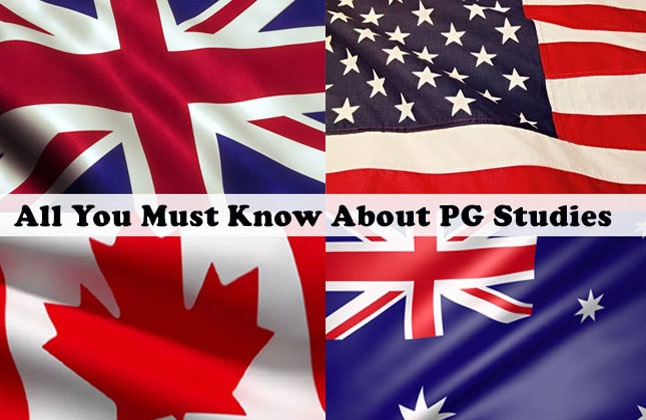March 2019
A postgraduate degree is
usually taken after completing a bachelor's degree. It is an advanced
level of the undergraduate level of education. Any person holding an
undergraduate qualification can pursue a post graduate program. A
postgraduate degree is of one year and can go on for the period of two
years if taken part time. Those studying a postgraduate program gain
advanced, specialized and detailed knowledge in their chosen field of
study.
The study at postgraduate level furbishes students to perform exceedingly well in the industry, making them ready to face all the industry challenges with the help of the knowledge imparted. Those holding a postgraduate degree/qualification always have an edge over those with only an undergraduate qualification looking for the same job roles and designation.
The study at postgraduate level furbishes students to perform exceedingly well in the industry, making them ready to face all the industry challenges with the help of the knowledge imparted. Those holding a postgraduate degree/qualification always have an edge over those with only an undergraduate qualification looking for the same job roles and designation.
The most common types of post graduate qualifications are:
- Postgraduate
certificate/diploma courses: A certificate or diploma course will always
be a step below any degree. A postgraduate certificate/diploma is
vocational in nature and caters to only a specific field of profession.
Their duration in comparison to a postgrad degree in always shorter.
- Master's Degree: Pursuing a master’s degree ensures a bright future. It provides in-depth and detailed knowledge about the field one chooses to major in. It is one of the highest qualifications anyone can pursue after a doctorate degree. A master’s degree is either research oriented, taught or a mixture of both. It is usually a 1-2 years degree program. The most common master’s degrees are Masters in Arts, Masters of Science, Masters of Business Administration, Masters of Engineering, etc.
- Doctorate Degree/PhD: This is a purely research based degree which is pursued after the completion of Masters or in some cases after the completion of bachelor’s. The students wanting to pursue a PhD course are expected to carry out extensive research – primary as well as secondary - in their chosen field of study. The duration of a PhD program lasts for the period of 3-4 years. The most common doctorate programs are Doctor of Philosophy, Doctor of Science, Doctor of Education, Doctor of Medicine, Doctor of Engineering, etc.
- Master's Degree: Pursuing a master’s degree ensures a bright future. It provides in-depth and detailed knowledge about the field one chooses to major in. It is one of the highest qualifications anyone can pursue after a doctorate degree. A master’s degree is either research oriented, taught or a mixture of both. It is usually a 1-2 years degree program. The most common master’s degrees are Masters in Arts, Masters of Science, Masters of Business Administration, Masters of Engineering, etc.
- Doctorate Degree/PhD: This is a purely research based degree which is pursued after the completion of Masters or in some cases after the completion of bachelor’s. The students wanting to pursue a PhD course are expected to carry out extensive research – primary as well as secondary - in their chosen field of study. The duration of a PhD program lasts for the period of 3-4 years. The most common doctorate programs are Doctor of Philosophy, Doctor of Science, Doctor of Education, Doctor of Medicine, Doctor of Engineering, etc.
Country wise brief about post-gradation study:
Post-Graduation in UK:
Universities in the UK do not
require you to necessarily have an undergraduate qualification unless
you have enough rich work/life experience. The UK offers various types
of post graduate studies which includes a taught or research based
study, part time or full time, and distance learning. The universities
in the UK prefer an overall of 60% marks in the undergraduate degree or
some additional qualification and work experience. Some of the top
ranked business schools however, require a minimum of 70-75 % to admit
students to their master’s program. Some universities might require
students to give the GMAT test especially for the finance courses and
MBA. The minimum score requirement for the same is 600-700.
Post-Graduation in USA:
To gain a postgraduate
qualification, one must first hold a bachelor’s degree or 16 years of
education. Apart from this, having work experience just makes it easier
for students to get into the US post graduate programs. USA is a country
that offers incredible variety of Post Graduate courses. An approximate
of 15 universities are ranked amongst the top 20 in the world out of
which most, specially offer post graduate programs. The post graduate
programs in the USA stress and focus highly on the research which makes
them stand out from the rest.
Post-Graduation in Canada:
Canadian universities too
require students to hold 16 years of education to pursue a postgraduate
program from Canada. This includes a 3 years bachelor’s program plus
additional one year of some other qualification or four years of
bachelor’s program. Students wanting to study a post graduate program in
Canada must hold at least 70%. Universities might also require students
to take tests like GRE and GMAT which highly depends of the courses the
students opt for.
Post-Graduation in Australia:
Australia offers a wide
variety of choices for post graduate studies. The individual
universities offer different strengths and capabilities, providing a
diverse base for research students. Australian universities pride
themselves on a strong research base and state of the art equipment to
their universities. To enter the Australian post graduate study program,
a good academic record including in the bachelor’s degree is necessary
along with work experience.
Student Testimonials:
It was a good experience.
In fact a great experience! I received immense help from the counselor
because of whom studying abroad became possible. God Bless!
Name - Aniruddh Omprakash
Country - UK
University - Cranfield University
Name - Aniruddh Omprakash
Country - UK
University - Cranfield University
My Experience with Edwise
was really Good. They have helped me with everything from helping me
finalize on a universities to preparing for my Visa.
Name - Sneha Suresh
Country - USA
University - University of Massachusetts
Name - Sneha Suresh
Country - USA
University - University of Massachusetts
I am really happy with my
Counselor and the entire Edwise team for being so cooperative and
supportive and helping me in all aspects starting from applying to
college till filing my visa. Thanks a ton to entire Edwise Team! God
Bless!
Name - Mohammed Zeeshan
Country - Canada
University - Lambton College
Name - Mohammed Zeeshan
Country - Canada
University - Lambton College
It has been very helpful
from the start. Great resources and excellent management. I was provided
with the right assistance. Everything went smoothly and without any
barriers. Thank you so much Edwise for all the help.
Name - Akanksha Baadkar
Country - Australia
University - University of Melbourne
Name - Akanksha Baadkar
Country - Australia
University - University of Melbourne
Edwise Overseas Education Consultant
We at Edwise streamline and
personalize the process for each student irrespective of the
destination, institution, course or any level of study. Our team of
experienced professionals will provide you individual attention and
exceptional guidance throughout your process of application. We provide
assistance related to course selections, admission, visa, bank-loan and scholarships.
We also host University delegates for direct student interaction and
all these services are provided free of cost. We have established since
1991 and have been maintaining strong networks with over 725 universities in 16 countries, hence giving us a unique insight into the finest educational establishments worldwide.
Start your education overseas with valuable information on everything you need to know about studying abroad from study permits, temporary resident visas and how much it costs, to finding the best suited program for you.
Start your education overseas with valuable information on everything you need to know about studying abroad from study permits, temporary resident visas and how much it costs, to finding the best suited program for you.



No comments:
Post a Comment